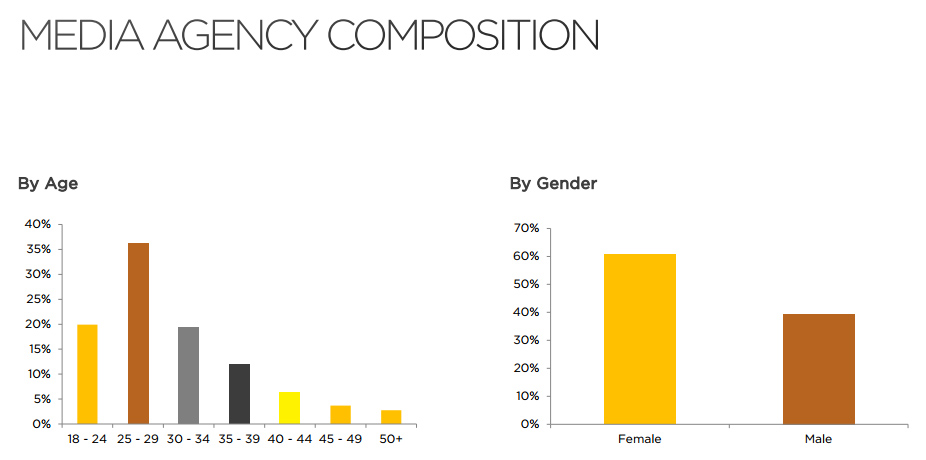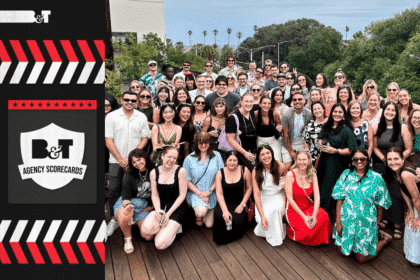The media and creative industries are underpinned by volatility, shrinking staff, anaemic budgets and days so long, they blur into the next. Is it really that surprising the up-and-comers want a bit more dosh?
According to the Media Federation of Australia’s latest census and salary survey released in February this year, the churn rate across media agencies in 2013 was 33.5%, up from 30.4% in 2012.
In June this year, B&T spoke to various media agency bosses who projected that number could jump as high as 40% this year.
According to a media industry survey by trade media channel, Media i, it’s 25-29 year-olds that constitute the largest percentage of media agency employees.

Meanwhile, on the creative agency side of things, churn is a little lower, with the Communications Council projecting a turnover rate of 28.81% based on a 2013 salary survey.
The topic of job-hopping for a pay rise is something of a sore point for many industry folk who are quick to point the finger at Gen Y for being flaky-entitled-globe-trotting-know-it-alls with their apparent inability to stay put and pay their dues.
“Job-hopping certainly takes place in our industry, especially at the junior level,” says Nat Brady, who heads up group development at creative agency, M&C Saatchi. “It’s an easy way to hop up in those five and 10 grand increments.”
Retaining staff is such a wide spread issue within media that in 2012 the MFA 5+ initiative was born, an ‘inspiration series’ by the Media Federation of Australia designed to inspire media professionals with five to ten years experience to create and lead successful careers.
It came about in response to findings that one in three professionals with five to 10 years experience are thinking about kissing media goodbye… for good.
So why are the juniors in both industries hopping about and how do we pin them down for long enough to learn a thing or two?
Director at Bold Media, Toby Hemming defends Gen Y, he believes their supposed knack for playing musical workplaces is hinged on ambition. He says: “If you’re a millennial, you’ll want to run your own agency and work in the UK or New York. You’re not going to get that staying where you are and you probably won’t get a pay rise unless you move.”
Rising star, Aleisha Hasslemore epitomises the driven ‘Gen Y type’ having founded her own communications start-up, Ultimate Edge Communications. She says: “It all comes back to the outcome you are chasing. Certainly as an up-and-comer, if you want to gain different experience in various parts of the industry, job hopping might be your best answer.”
“However there is something to be said about loyalty and not jumping before you are ready. I stayed with the one network, worked hard and doubled my salary year-on-year multiple times,” adds Hasslemore.
Adshel’s chief marketing officer, Nicole McInnes agrees, saying: “Everyone loves a pay rise but I believe the best employees are not driven solely by money.” She argues that individuals should weigh up salary against things like flexibility, healthy culture and respect in the workplace. “If you have those where you are, it’s hard to put a monetary figure on happiness at work, but it should never be underestimated or taken for granted,” says McInnes.
For many Gen Y’s, though, the lure of more money can mean an increased sense of self worth. And for the driven go-getter types, a balanced work style may be little too unsatisfying for their hunger to reach the top. In which case, stints at overseas agencies and a ruthless attitude may assist in getting ahead. “If you look at the heads of many of these agencies, I’d be so surprised if many of them have come up through the ranks. If you look at them, they’ve worked at loads of places and as an Australian, you have to travel to get the experience you need,” argues Hemming.
The truth is, even if it’s short-term gain, there’s money to be made by not sitting still. “Most business models mean that a company with a vacancy has a greater ability to offer a candidate more money due to their obvious gap and immediate need,” says McInnes.
So is job-hopping a good idea then?
Lorraine Jokovic, the CEO at creative agency, LOUD Communications says: “Sometimes it is. But, it comes with risks – big ones.” She knows this to be true, as she’s experienced it first hand.
“I took a role with a large agency network to manage one of their key pieces of business… I was offered a salary that was over 30% more than I’d been earning at my previous role; which by the way I was very happy in and wasn’t looking to leave.
“My old client service director referred to my new salary windfall as ‘danger money’. ‘No’, I thought, ‘this is my real value’ and I took the job,” explained Jokovic.
“He was right. The job was a nightmare. Within three months I started to look for another role,” she added.
Denise Shrivell, founder of media information hub, MediaScope believes, “We’re all guilty of new shiny objects” but believes it’s not about job-hopping to make more dosh, it’s about positioning one’s self to be a valuable employee by adapting to constant change in the industry. She says: “I get upset with people who tend to rest on their laurels. You can’t do that in this market and nor should you – it’s your responsibility to understand what consumers want in this market.”
Shrivell is concerned that Uni courses aren’t preparing students for the harsh realities that exist in the industry. “You have to be adaptable to change, it’s about survival of the fittest,” says Shrivell. “Some days are harder than others but my mantra is: Just turn up everyday,” she adds.
But you don’t want to be turning up each day to the wrong place.
“If you’re in the right agency with the right development programs in place that have the ability to offer staff the opportunities they need to challenge themselves then that’s playing the long-term game – caveating you’re in the right place,” says M&C Saatchi’s Brady.
“What takes a while to understand is what you lose in job-hopping, namely the reputation, relationships and ease from setting up a foundation over months or years in your role.
“Even if your reputation got you the next gig there is no escaping having to prove yourself all over again with your new colleagues and managers and a new set of stakeholders,” says McInnes.
Hasselmore, a successful young media professional hasn’t felt compelled to job-hop in a bid to find her worth, “during my 5.5 years as an account director at ARN I was offered many opportunities to jump ship with the promise of increased pay and benefits,” she says. But Hasslemore chose to stay loyal to ARN and for her, that choice paid off. She falls into the category of ‘hungry Gen Y-ers’ having recently launched her own media start-up.
It seems possible to be fairly remunerated while climbing the ranks by remaining loyal to a company, but it does require an amount of discretion.
“My advice would be find a great company that aligns with your values and commit to them for a decent amount of time. Work hard, get some solid wins under your belt and then reassess your next steps from there,” says Hasslemore.








